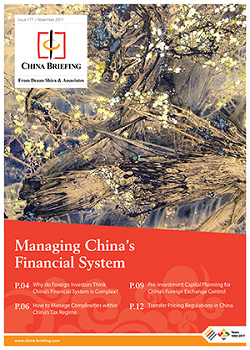Managing China’s Financial System – New Issue of China Briefing Magazine
 The latest issue of China Briefing Magazine, titled “Managing China’s Financial System“, is out now and currently available to subscribers as a complimentary download from the Asia Briefing Publication Store.
The latest issue of China Briefing Magazine, titled “Managing China’s Financial System“, is out now and currently available to subscribers as a complimentary download from the Asia Briefing Publication Store.
In this issue:
- Why do Foreign Investors think China’s Financial System is Complex?
- How to Manage Complexities within China’s Tax Regime
- Pre-investment Capital Planning for China’s Foreign Exchange Control
- Transfer Pricing Regulations in China
Foreign investors often find China’s financial system to be one of the most difficult areas to navigate when establishing or growing their presence in the country. Navigating China’s tax system, and its complexities, requires time and commitment.
That should not come as a surprise. The World Bank recently ranked China 130 out of 190 jurisdictions for ease of paying taxes, for example. Overseas-based financial administration teams too often find that mastering the financial system in China is more complicated than in other jurisdictions.
A complex bureaucracy and licensing regime, idiosyncratic features, strict capital controls, and frequent audits – as well as pronounced regional variance – all contribute to this complexity. These issues are borne of seemingly mundane day-to-day tasks, such as issuing invoices known as fapiao, as well as for more complex and strategically important issues, like profit repatriation and intercompany payments.
In this issue of China Briefing Magazine, we look at the factors that make China’s financial system unique and complex, and identify steps foreign investors can take to overcome the resulting challenges.
First, we look at the issues that most commonly disorient foreign investors. We then take a closer look at some of these complexities, and what businesses can do to manage them. Next, we discuss the importance of pre-investment capital planning in the context of tough foreign exchange controls, before examining the ever-maturing regulations for the transfer pricing system.
|
China Briefing is published by Asia Briefing, a subsidiary of Dezan Shira & Associates. We produce material for foreign investors throughout Asia, including ASEAN, India, Indonesia, Russia, the Silk Road, and Vietnam. For editorial matters please contact us here, and for a complimentary subscription to our products, please click here. Dezan Shira & Associates is a full service practice in China, providing business intelligence, due diligence, legal, tax, IT, HR, payroll, and advisory services throughout the China and Asian region. For assistance with China business issues or investments into China, please contact us at china@dezshira.com or visit us at www.dezshira.com
|

Dezan Shira & Associates Brochure
Dezan Shira & Associates is a pan-Asia, multi-disciplinary professional services firm, providing legal, tax and operational advisory to international corporate investors. Operational throughout China, ASEAN and India, our mission is to guide foreign companies through Asia’s complex regulatory environment and assist them with all aspects of establishing, maintaining and growing their business operations in the region. This brochure provides an overview of the services and expertise Dezan Shira & Associates can provide.
An Introduction to Doing Business in China 2017
This Dezan Shira & Associates 2017 China guide provides a comprehensive background and details of all aspects of setting up and operating an American business in China, including due diligence and compliance issues, IP protection, corporate establishment options, calculating tax liabilities, as well as discussing on-going operational issues such as managing bookkeeping, accounts, banking, HR, Payroll, annual license renewals, audit, FCPA compliance and consolidation with US standards and Head Office reporting.
 China’s Investment Landscape: Identifying New Opportunities
China’s Investment Landscape: Identifying New Opportunities
China’s foreign investment landscape has experienced pivotal changes this year. In this issue of China Briefing magazine, we examine how foreign investors can capitalize on China’s latest FDI reforms. First, we outline new industry liberalizations in both China’s FTZs and the country at large. We then consider when an FTZ makes sense as an investment location, and what businesses should consider when entering one. Finally, we give an overview of China’s latest pro-business reforms that streamline a wide range of administrative and regulatory measures.
- Previous Article The Electric Vehicle Battery Industry in China
- Next Article China’s Pollution Crackdown and its Impact on Business











